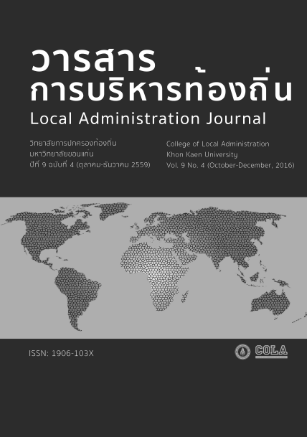ความขัดแย้งและความรุนแรงของการเมืองท้องถิ่นไทย: ศึกษากรณีเทศบาลตำบลบ้านดู่ อำเภอเมือง จังหวัดเชียงราย
Keywords:
ความขัดแย้งทางการเมือง, ความรุนแรงทางการเมือง, การเมืองท้องถิ่น, การกระจายอำนาจ, Political Conflict, Political Violence, Local Politics, DecentralizationAbstract
การศึกษาเรื่องนี้มีวัตถุประสงค์หลักเพื่อ (1) ศึกษาทำความเข้าใจถึงลักษณะ สาเหตุ รวมทั้งกระบวนการแก้ไขความขัดแย้งในพื้นที่กรณีศึกษา และ (2) วิเคราะห์ว่ามีเงื่อนไขปัจจัยใดบ้างที่แปรเปลี่ยนความขัดแย้งไปสู่การใช้ความรุนแรง และเหตุรุนแรงนั้นได้ส่งผลกระทบอย่างไรต่อท้องถิ่น
สำหรับวิธีการศึกษาได้อาศัยข้อมูลเชิงคุณภาพจากหลากหลายแหล่งผสมผสานกัน ไม่ว่าจะเป็นสัมภาษณ์ผู้ที่เกี่ยวข้องหลายฝ่าย เอกสารของทางราชการ หนังสือพิมพ์ เป็นต้น นำเสนอโดยอธิบายเรียงลำดับเวลา
ผลการศึกษาจากกรณีเทศบาลตำบลบ้านดู่ อำเภอเมือง จังหวัดเชียงราย บ่งชี้ว่า (1) ความขัดแย้งเกิดขึ้นในหลายลักษณะ บางช่วงเป็นความขัดแย้งระหว่างฝ่ายบริหารกับฝ่ายสภา บางช่วงเป็นความขัดแย้งระหว่างฝ่ายการเมืองกับฝ่ายประจำ สาเหตุมาจากทั้งปัจจัยส่วนบุคคล ปัจจัยเชิงโครงสร้าง การแข่งขันระหว่างกลุ่มการเมืองในการเลือกตั้ง รวมถึงอาจมีเรื่องของผลประโยชน์เข้ามาเกี่ยวข้องด้วย (2) เหตุการณ์รุนแรงที่สุดเท่าที่เคยปรากฏคือ การข่มขู่ด้วยอาวุธปืน ส่วนการชุมนุมประท้วง ร้องเรียน ฟ้องร้องดำเนินคดี ฯลฯ ทำนองนี้ ถึงแม้จะมีมากมาย แต่ก็ยังคงเป็นไปตามวิถีทางของระบบ ซึ่งเป็นที่ยอมรับได้ในการนำมาใช้จัดการความขัดแย้งต่าง ๆ
ปัจจัยที่แปรเปลี่ยนความขัดแย้งไปสู่ความรุนแรงพบหลายเงื่อนไขด้วยกัน เช่น เกิดขึ้นในระหว่างที่มีการเปลี่ยนตัวผู้บริหารท้องถิ่นชั่วคราว, เป็นช่วงที่กำลังมีประเด็นขัดแย้งตอบโต้กันอยู่หลายเรื่อง ผลกระทบจากความขัดแย้งข้างต้นสะท้อนถึงภาวะการเมืองที่ขาดความเป็นเอกภาพ ทำให้มีการเปลี่ยนแปลงผู้บริหารหลายครั้ง อนึ่ง เหตุการณ์ที่ช่วยให้ความขัดแย้งคลี่คลายได้แก่ การที่ผู้บริหารในฝ่ายประจำยอมผ่อนท่าทีลง โดยขอย้ายตัวเองออกนอกพื้นที่เพื่อหลีกเลี่ยงเหตุรุนแรงที่อาจจะเกิดขึ้นตามมา
Conflict and Violence of Local Politics in Thailand: A Case Study of Bandu Subdistrict Municipality, Mueang, Chiang Rai
The main objectives of this study are to (1) study characteristics, causes, and problem solving process of conflicts, (2) analyze and understand factors that turn political conflicts into violence and effects of the violence on the locals.
The study was conducted by gathering qualitative information from many different sources, including interviewing people from different parties involved and examining official government documents and newspapers. The gathered information was sorted and presented in a chronological order.
The result from the study showed that (1) there were different types of conflicts. Some of the conflicts were between the executive and the council, and others between government officials and political officials. The causes of the conflicts were from personal issues, structural issues, competition between political groups during elections, and conflicts of interests. (2) So far, the most serious action resulted by the conflicts was an intimidation with a gun. There were also some other actions, e.g., demonstrations, complaints, and litigations, which were socially acceptable in dealing with conflicts.
There were many conditions that turned conflicts into violence, such as the incidents had been happening during the changing of the executives, or during retorting on disagreement issues. The conflicts implied a lack of unity and led to changes of the executives. The incident that diminished the conflict was that the executives compromised by moving out from the conflict areas to avoid the violence that might happen later.
Downloads
Published
How to Cite
Issue
Section
License
The copyright of all articles published in the Local Administration Journalis owned by the College of Local Administration, Khon Kaen University.



